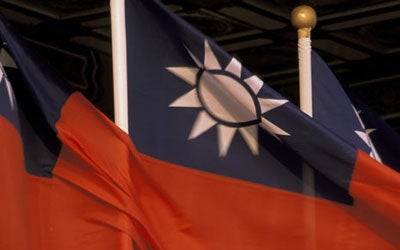This Wednesday, Dr. Edwin Feulner and The Heritage Foundation are pleased to host John Chiang, vice chairman of the Kuomintang (KMT) Party in Taiwan.
Chiang, the grandson of former President Chiang Kai-shek, will be discussing “Cross-Strait Relations After Taiwan’s 2012 Election,” an issue of heightened relevance given the re-election of President Ma Ying-jeou. You can RSVP by clicking here.
First, however, hats off to Taiwan for the election. Dr. Feulner and Walter Lohman, director of Heritage’s Asian Studies Center, were both in Taiwan to witness the election first-hand. By all accounts, Taiwan demonstrated that it is a mature democracy—just 16 short years after its first direct presidential election in 1996.
President Ma and the KMT declared victory a mere three hours after the polling stations closed, a testament to the election’s organization and efficiency. Tsai Ing-wen, the Democratic Progressive Party (DPP) candidate, gracefully admitted defeat and resigned from her position as DPP chairwoman. The Taiwanese people spoke, and democracy won, as it has in many parts of Asia recently.
Cross-strait relations played a central role in this election, with the DPP lambasting Ma’s overtures toward warming relations with China. Under Ma, China–Taiwan relations are the most stable in decades, with an economic partnership agreement signed, hundreds of direct flights established, and people-to-people links strengthened. Yet China has still not renounced the use of force in taking Taiwan, and Tsai accused Ma of forsaking Taiwan’s identity and seeking reunification. Ma fiercely denied such claims, insisting that he adheres to the “three no’s”—no independence, no unification, and no use of force with China. Ultimately, the three no’s carried the day.
China will also oversee a leadership transition later this year, with Xi Jinping widely expected to replace Hu Jintao. But unlike in Taiwan, the Chinese people will have no real voice in this transition process. The Chinese leadership is fond of pointing toward messy democratic elections in an attempt to vindicate their authoritarian centralization of power, but they will have no such talking points for the Taiwanese election. Still, China’s leadership transition clouds any predictions on the next step in cross-strait relations.
The United States is the final piece of the puzzle. As Heritage’s Dean Cheng stated, “A strong Taiwan, confident in its relationship with the U.S., is key to peace and security in the region.” Yet the Obama Administration has so far not demonstrated the kind of commitment that Taiwan needs to guarantee its security. Cheng recommends dispatching a Cabinet official to Taiwan as soon as possible, for the first time in 12 years, to ameliorate this situation.
Chiang will touch upon these issues and more during his discussion this Wednesday. As the foreign minister of Taiwan shortly after the 1996 Taiwan Strait crisis, his intimate experience with the challenge and opportunity of cross-strait relations will prove invaluable. Chiang is in Washington to celebrate the 60th National Prayer Breakfast, an annual interfaith event held to champion faith, freedom, democracy, and human rights—values that bind the U.S. and Taiwan together—and will speak from 10:30 am to 11:30 am in Heritage’s Lehrman Auditorium.
